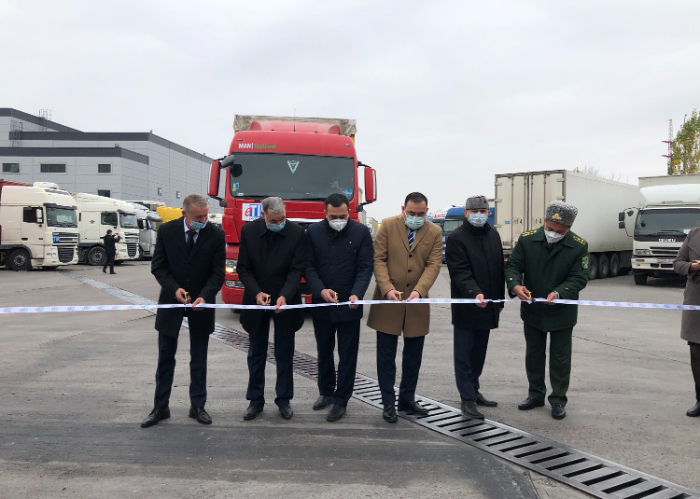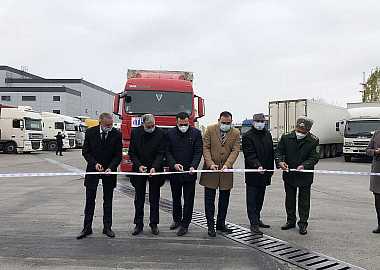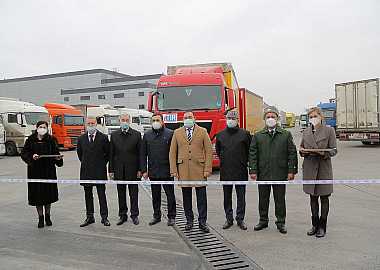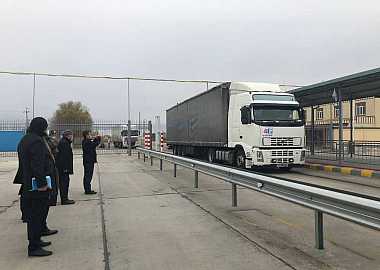The ceremony of launching the eTIR pilot project between Uzbekistan and Kazakhstan within the framework of the Turkic Council took place in Uzbekistan on 17 November 2020 with the partnership of Customs Authorities of both countries and the International Road Transport Union (IRU).
The event was attended by the representatives of Turkic Council, customs authorities, ministries of transport, as well as associations of international road carriers of Uzbekistan and Kazakhstan and IRU.
"eTIR" is aimed at digitalization of the system of transport of goods and allows holders to carry cargo without passing the customs control procedures at the border.
During his speech at the ceremony, the Deputy Secretary General of the Turkic Council Mr. Mirvokhid Azimov stressed the importance of eTIR in international freight transport which will significantly simplify the work of both customs authorities and cargo carriers, reduce operational costs, accelerate transportation and make it more secure due to the availability of a reliable international electronic database, working in real time.
Deputy Secretary M.Azimov underlined that at the Extraordinary Summit of the Turkic Council held on 10 April 2020, the Heads of Member States identified priority tasks to expand transport cooperation in order to ensure food security and the smooth movement of basic goods during a pandemic and reaffirmed the importance of developing non-contact foreign trade and multimodal systems among the Parties.
In this regard, the launch of the eTIR pilot project between Kazakhstan and Uzbekistan should be regarded as a vivid example of successful interaction and practical implementation of the core tasks set by our leaders.
In addition, the need for expansion of the circle of eTIR pilot project participants by involving the other Member and Observer States of the Organization was also highlighted.
The participants also underscored the importance of such initiatives and expressed their readiness to further cooperate in implementing solid projects and programs within the framework of the Turkic Council aimed at addressing existing barriers to the creation of effective and sustainable transport mechanisms.
The event was attended by the representatives of Turkic Council, customs authorities, ministries of transport, as well as associations of international road carriers of Uzbekistan and Kazakhstan and IRU.
"eTIR" is aimed at digitalization of the system of transport of goods and allows holders to carry cargo without passing the customs control procedures at the border.
During his speech at the ceremony, the Deputy Secretary General of the Turkic Council Mr. Mirvokhid Azimov stressed the importance of eTIR in international freight transport which will significantly simplify the work of both customs authorities and cargo carriers, reduce operational costs, accelerate transportation and make it more secure due to the availability of a reliable international electronic database, working in real time.
Deputy Secretary M.Azimov underlined that at the Extraordinary Summit of the Turkic Council held on 10 April 2020, the Heads of Member States identified priority tasks to expand transport cooperation in order to ensure food security and the smooth movement of basic goods during a pandemic and reaffirmed the importance of developing non-contact foreign trade and multimodal systems among the Parties.
In this regard, the launch of the eTIR pilot project between Kazakhstan and Uzbekistan should be regarded as a vivid example of successful interaction and practical implementation of the core tasks set by our leaders.
In addition, the need for expansion of the circle of eTIR pilot project participants by involving the other Member and Observer States of the Organization was also highlighted.
The participants also underscored the importance of such initiatives and expressed their readiness to further cooperate in implementing solid projects and programs within the framework of the Turkic Council aimed at addressing existing barriers to the creation of effective and sustainable transport mechanisms.











